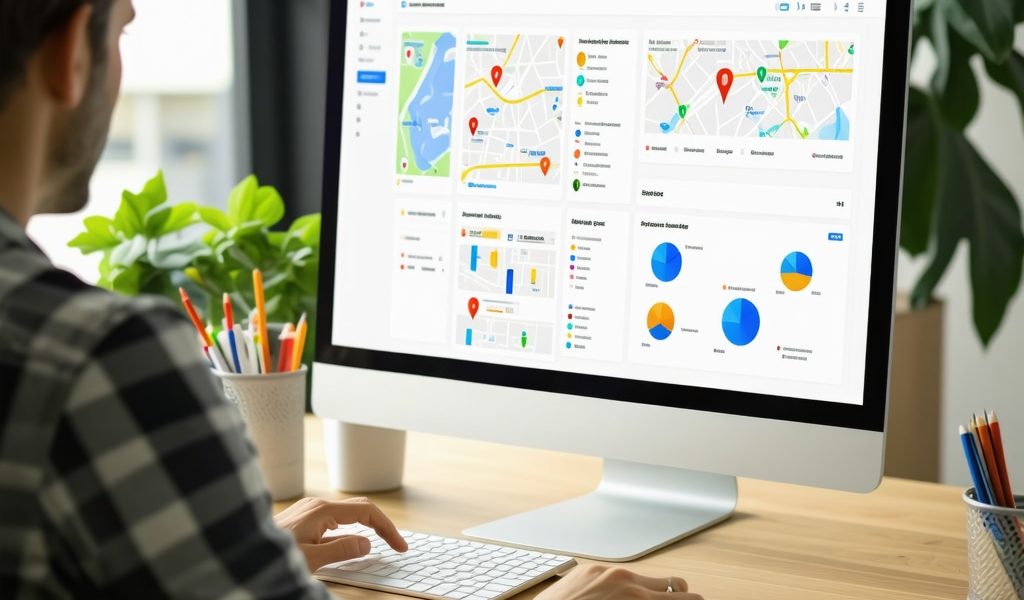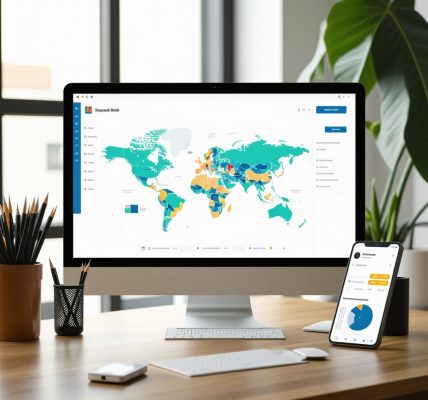Unlocking the Power of GMB Citations: An Expert’s Guide to Dominating Local Search Rankings
In the fiercely competitive arena of local SEO, managing GMB citations is no longer a mere administrative task but a strategic lever that can propel your business to the top of local search results. With Google’s evolving algorithms emphasizing consistency, authority, and relevance, mastering citation management becomes essential for any serious local business aiming for visibility and credibility. This comprehensive guide delves into advanced methodologies and nuanced strategies to optimize your GMB citations for superior search performance in 2025.
The Role of Citation Consistency and Authority in Local SEO
At the core of citation management lies the principle of NAP consistency—name, address, and phone number accuracy across all platforms. Discrepancies diminish trustworthiness and negatively impact rankings, as highlighted in authoritative SEO research by Moz. Beyond consistency, the authority and trust signals embedded in your citation sources significantly influence local pack visibility. Prioritize high-authority directories such as industry-specific sites and reputable business listings to bolster your local SEO signals.
Leveraging Niche-Specific and Hyperlocal Citation Strategies
Advanced citation management involves targeting niche-specific directories that align with your industry, enhancing relevance and local authority. For example, a medical practice should focus on healthcare directories, while a restaurant benefits from culinary and local food guides. Furthermore, hyperlocal citations—those embedded within community blogs, local news outlets, and neighborhood portals—can dramatically improve your local pack rankings. These sources serve as trust signals within hyperlocal contexts, effectively outranking broader, generic listings.
Integrating Structured Data and Schema Markup for Citation Optimization
Beyond traditional citations, structured data markup, especially LocalBusiness schema, enhances your listing’s visibility and click-through rates. Proper schema implementation ensures search engines interpret your business details accurately, reinforcing your citations and improving local search prominence. This technical aspect of citation management requires meticulous validation, often through tools like Google’s Rich Results Test or Schema.org validation services.
How to Quantify and Enhance Citation Quality and Quantity?
While quantity of citations correlates with ranking improvements, quality and relevance overshadow sheer numbers. Conduct regular GMB SEO audits to identify citation gaps and inaccuracies. Use backlink analysis tools to assess citation sources’ authority, ensuring your citations originate from reputable platforms. Consider deploying citation-building services that utilize advanced vetting processes for higher quality and strategic placement, as discussed in industry white papers.
What Are the Emerging Trends in GMB Citation Management for 2025?
Emerging trends include the integration of AI-driven citation monitoring tools, real-time citation correction, and the increasing importance of user-generated content like reviews and photos, which complement citations. Additionally, the rise of voice search optimization necessitates citations that align with conversational queries, further emphasizing the importance of semantic relevance in your citation strategy.
For those seeking to refine their approach, exploring expert GMB citation services can provide a competitive edge. Ensuring your citations are accurate, authoritative, and strategically placed is essential for thriving in a dynamic local SEO landscape.
Engage with fellow professionals and contribute insights into citation management best practices by participating in industry forums and webinars. Continuous learning and adaptation are crucial as Google’s algorithms become increasingly sophisticated in evaluating local relevance and authority.
Unlocking the Next Frontier of GMB Citations: Hyperlocal and Niche-Specific Optimization in 2025
As local SEO continues to evolve, hyperlocal citations are emerging as a game-changer for businesses aiming to dominate their neighborhood markets. These citations, embedded within community blogs, local news outlets, and neighborhood portals, serve as trust signals that elevate your Google Business Profile (GMB) visibility. But how can you effectively harness this trend to outrank competitors? The secret lies in integrating hyperlocal relevance with targeted niche-specific directories, creating a layered citation network that amplifies your local authority.
Developing a Strategic Framework for Citation Hierarchies
One advanced approach involves constructing a citation hierarchy—where broad, high-authority directories form the foundation, complemented by hyperlocal and niche-specific sources that act as relevance boosters. Think of it as building a digital reputation pyramid: the base is composed of reputable business directories, the middle layer includes industry-specific and community-focused listings, and the apex captures real-time user-generated content and social mentions. This multi-tiered strategy ensures your citations are both authoritative and contextually relevant, which search engines interpret as a sign of comprehensive local presence.
Implementing this requires meticulous planning and continuous monitoring. Tools like hyperlocal SEO tactics can help identify and prioritize these sources, ensuring your efforts align with evolving search engine algorithms that favor contextual signals.
Challenging Assumptions: Are Citations Still King in 2025?
Many believe that citation quantity alone guarantees local search dominance. However, recent SEO insights suggest that quality, relevance, and semantic consistency are more impactful than sheer numbers. For instance, a study by BrightLocal emphasizes the importance of consistent NAP data across all hyperlocal platforms and the integration of reviews and photos that reinforce your local relevance. This nuanced understanding underscores the importance of a holistic local SEO strategy that combines citations with user engagement and content relevance.
Furthermore, emerging AI-powered tools enable real-time citation auditing and correction, allowing businesses to maintain high standards of accuracy and relevance effortlessly. These innovations make it feasible to dynamically adjust your citation strategy, reacting swiftly to market changes and competitor moves.
How can businesses leverage AI and machine learning to refine their hyperlocal citation strategies dynamically?
Incorporating AI-driven tools for citation management can streamline the process of identifying citation gaps, correcting inconsistencies, and discovering new hyperlocal opportunities. For example, platforms that analyze citation authority and relevance can suggest targeted directories and community sites, ensuring your efforts are both efficient and effective. This data-driven approach not only enhances citation quality but also accelerates your path to local search dominance.
To explore innovative citation solutions, consider consulting with expert GMB citation services that leverage cutting-edge technology to optimize your local visibility comprehensively.
Interested in sharing your experiences or learning from others? Join industry forums, participate in webinars, or comment below with your insights on hyperlocal citation tactics. Staying connected and informed is vital in the rapidly shifting landscape of local SEO.
Harnessing the Power of Citation Diversification for Local SEO Supremacy
In the relentless quest for local search dominance, diversifying your GMB citation portfolio isn’t just a smart move—it’s an essential strategy that reflects a nuanced understanding of search engine algorithms. Beyond the traditional focus on high-authority directories, advanced practitioners are now leveraging a broad spectrum of niche, community, and contextual citations to create a multifaceted local presence. This layered approach ensures that your business remains resilient against algorithm updates and enhances relevance across different user intents.
For example, integrating citations from industry-specific forums, local event listings, and social media platforms can substantially augment your local signals. The key is ensuring each citation aligns with your core keywords and local identifiers, thereby reinforcing topical authority while maintaining NAP consistency. This approach also involves proactive citation mapping—using sophisticated tools to track citation sources, identify gaps, and monitor fluctuations in citation strength over time.
The Art of Citation Semantic Optimization: Moving Beyond NAP
While NAP consistency remains foundational, emerging research underscores the importance of semantic optimization in citation strategy. Embedding relevant keywords, service descriptions, and contextual signals within citations—such as reviews, tags, and categories—can greatly influence how search engines interpret your local relevance. This semantic layer enables your business to appear in more nuanced, conversational searches, especially as voice and AI-driven queries grow in prominence.
For instance, a landscaping company might incorporate terms like “sustainable gardening” or “urban landscaping experts” within citations, aligning with common search phrases in their locale. This tactic requires meticulous content management and often, the use of schema markup to embed rich, machine-readable data that enhances visibility.
Integrating Hyperlocal Content and User Engagement to Amplify Citation Effectiveness
Hyperlocal content—such as community-driven blogs, neighborhood news reports, and local event pages—serves as powerful contextual anchors that elevate your citation strategy. Embedding your NAP details within such content not only boosts local relevance but also fosters community trust and engagement. Moreover, user-generated content like reviews and photos acts as dynamic citations, enriching your profile with fresh, authentic signals.

To capitalize on this, businesses should actively participate in local digital communities, sponsor neighborhood events, and encourage satisfied customers to share reviews and photos. This creates a vibrant citation ecosystem that search engines interpret as high-authority, trustworthy local signals.
Utilizing AI and Machine Learning for Real-Time Citation Management and Optimization
Artificial intelligence is transforming citation management from a manual chore into a dynamic, real-time process. Advanced AI tools analyze citation patterns, identify inconsistencies, and suggest immediate corrections or new citation opportunities based on current local search trends. This proactive approach ensures your citations remain accurate, relevant, and competitive, even as local search landscapes evolve rapidly.
For example, AI-powered platforms can scan thousands of local directories, social platforms, and community sites to detect outdated or duplicate citations, automatically flagging them for correction. These tools also help in discovering emerging hyperlocal sources, ensuring your citation hierarchy adapts fluidly to market changes.
What are the cutting-edge AI techniques that can help local businesses dynamically adapt their citation strategies in the face of rapid algorithm changes?
State-of-the-art techniques include natural language processing (NLP) for semantic analysis of local search queries, machine learning models trained on local ranking factors, and predictive analytics that forecast citation impact based on historical data. Integrating these technologies into your local SEO workflow offers a strategic advantage, enabling you to stay ahead of competitors and maintain top rankings in an increasingly complex landscape.
For those eager to explore these innovations, consulting with top-tier GMB optimization agencies that employ AI-driven citation management is a prudent step. Their expertise can help craft a resilient, future-proof local SEO strategy that leverages the latest technological advancements.
Engaging with industry forums, webinars, and ongoing training ensures your team remains at the forefront of citation innovation. Remember, in the ever-evolving realm of local SEO, continuous learning and adaptive strategies are the keys to sustained success.
Harnessing the Synergy of Hyperlocal Content and Advanced Citation Tactics for 2025
In the ever-evolving landscape of local SEO, leveraging hyperlocal content alongside sophisticated citation strategies is crucial for securing a competitive edge. Hyperlocal content—such as neighborhood blogs, community news, and localized event pages—serves as a potent vehicle for embedding your business within the community fabric. When integrated with a layered citation hierarchy, these hyperlocal signals amplify your relevance and trustworthiness, leading to higher rankings in local packs.
Implementing this approach involves strategic content creation that naturally incorporates your NAP details and relevant service keywords, ensuring search engines interpret your local intent accurately. For instance, sponsoring and participating in local events can generate authentic, user-driven citations through reviews and social mentions, further enriching your local profile. This layered, community-centric citation ecosystem fortifies your business’s local authority and resilience against algorithm fluctuations.
Decoding the Role of Semantic Optimization in Citation Efficacy
While traditional NAP consistency remains the backbone of citation strategy, semantic optimization propels your local SEO efforts into a new dimension. Embedding contextually relevant keywords, industry-specific phrases, and service descriptions within citations enhances search engine comprehension of your business relevance. Advanced schema markup, such as LocalBusiness and Service schema types, further elevates your visibility by providing structured, machine-readable data that search engines can easily interpret and display in rich snippets.
For example, a boutique hotel should incorporate terms like “luxury boutique accommodations” and “romantic getaway packages” within its citations, aligning with common local search queries. This semantic layering ensures your business appears in nuanced, conversational searches, especially vital as voice search and AI-driven queries become dominant.
What Are the Most Effective AI-Driven Citation Optimization Techniques?
Emerging AI technologies facilitate real-time citation auditing, dynamic correction, and opportunity identification, revolutionizing how local businesses manage their citation portfolios. Natural language processing (NLP) algorithms analyze citation content for semantic consistency and relevance, flagging discrepancies and suggesting precise updates. Machine learning models predict citation impact based on historical ranking data, enabling proactive adjustments to your citation hierarchy.
Furthermore, AI-powered platforms can scan thousands of local directories, social platforms, and hyperlocal sources to discover emerging citation opportunities aligned with your niche and geographic area. This proactive, data-driven approach ensures your citations remain authoritative, accurate, and strategically positioned, significantly enhancing your local search dominance.
How can businesses harness AI and machine learning to adapt their citation strategies amid rapid algorithm changes?
By adopting AI tools that continuously analyze citation performance and competitor activity, businesses can dynamically refine their citation hierarchies, optimize content relevance, and maintain high consistency standards. Predictive analytics forecast shifts in local search algorithms, allowing preemptive strategy adjustments. Partnering with expert agencies utilizing these technologies ensures your local SEO efforts are resilient, adaptive, and future-proofed.
Explore partnerships with leading GMB optimization agencies that leverage AI-driven citation management to stay ahead of the curve and maximize local visibility in 2025 and beyond.
Expert Insights & Advanced Considerations
1. Embrace Semantic Optimization
Beyond NAP accuracy, incorporating semantic signals such as industry-specific keywords and schema markup enhances search engine understanding, making your citations more relevant and competitive in local searches.
2. Leverage Hyperlocal Content for Trust Building
Embedding your NAP in community blogs, local news, and neighborhood portals creates authentic trust signals, boosting your visibility and authority within targeted local markets.
3. Utilize AI for Dynamic Citation Management
AI-driven tools enable real-time citation audits, automatic corrections, and discovery of new hyperlocal opportunities, ensuring your local SEO strategy remains agile and resilient against algorithm shifts.
4. Diversify Citation Sources Strategically
Expand beyond high-authority directories to include niche, community, and social media platforms, creating a layered citation network that enhances relevance and safeguards against algorithm updates.
5. Prioritize Citation Quality Over Quantity
Focus on authoritative, relevant sources and consistent data to build a credible, impactful citation profile that directly influences local rankings and user trust.
Curated Expert Resources
- BrightLocal Blog: Offers comprehensive guides on hyperlocal SEO and citation strategies tailored for 2025 trends.
- Google’s Schema Markup Documentation: Essential for implementing structured data that amplifies citation relevance and visibility.
- Moz Local: Provides insights into maintaining NAP consistency and local listing accuracy across platforms.
- SEMrush Local SEO Toolkit: Facilitates citation auditing, competitive analysis, and strategic source discovery.
Final Expert Perspective
In 2025, the landscape of local SEO and GMB citation management demands a sophisticated, nuanced approach. Integrating semantic optimization, hyperlocal content, and AI-driven management forms the backbone of a resilient strategy that can outpace competitors and dominate local search rankings. Continuous learning from authoritative resources and adapting to emerging trends isn’t optional—it’s essential. Engage with industry peers, leverage cutting-edge tools, and refine your tactics to ensure your business remains at the forefront of local visibility. For those committed to mastery, exploring expert GMB citation services is a strategic move to unlock next-level success.



